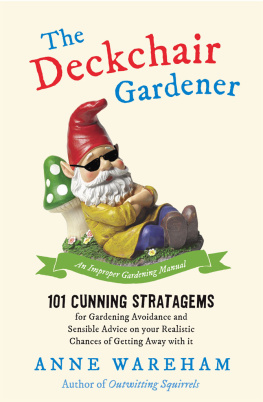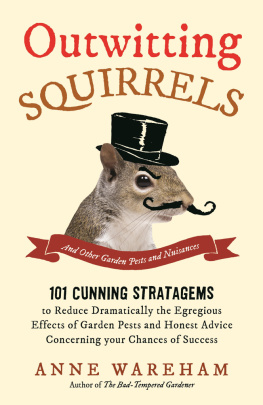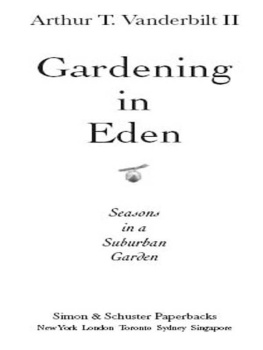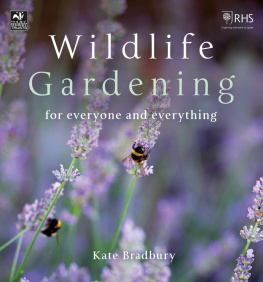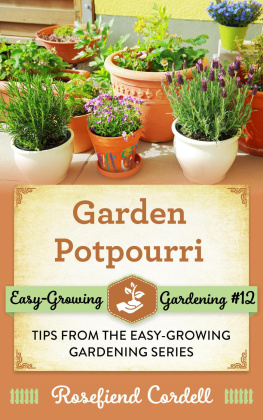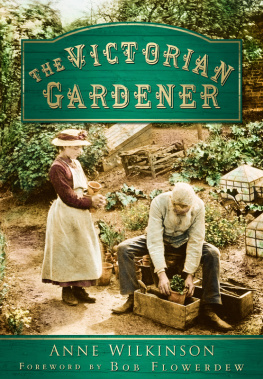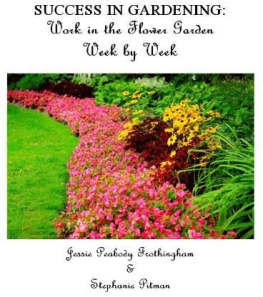Also by Anne Wareham
Outwitting Squirrels: and Other Garden Pests and Nuisances

Especially for those who love gardens and hate gardening.
First published in Great Britain in 2017 by
Michael OMara Books Limited
9 Lion Yard
Tremadoc Road
London SW4 7NQ
Copyright Anne Wareham 2017
All rights reserved. You may not copy, store, distribute, transmit, reproduce or otherwise make available this publication (or any part of it) in any form, or by any means (electronic, digital, optical, mechanical, photocopying, recording or otherwise), without the prior written permission of the publisher. Any person who does any unauthorized act in relation to this publication may be liable to criminal prosecution and civil claims for damages.
A CIP catalogue record for this book is available from the British Library.
ISBN: 978-1-78243-642-3 in paperback print format
ISBN: 978-1-78243-643-0 in ebook format
Illustrations by Kate Charlesworth
www.mombooks.com
Its not nice to be called lazy, but as we live in a world where long working hours and hectic schedules are the exhausting norm for many of us, we do need to take it easy sometimes. When we finally have some spare time, we often find ourselves too decrepit and fed up to spend it feeding, mowing, seeding, scarifying, de-mossing and weeding the lawn. Generally, for a great many of us caring for a demanding garden is just too much. But if you have managed to acquire a house or ground-floor flat in this country, you are likely to have such a monster outside, practically yelling for attention. And you may possibly have critical neighbours peering at the muddy mess and thinking bad thoughts about you. Or so you fear.
So this book is not addressed to the keen gardener, though I hope they will also find treasure within. Its principally addressed to you, the much-neglected reluctant gardener. You dont watch the TV gardening shows longing to know how to grow a cucumber, and you never touch gardening magazines because they bring on a severe bout of depression. You may be reluctant because you hate the outdoors and hate gardening outdoors most of all. Maybe the garden is just too big, or youd love a beautiful garden but theres no way you want outdoor housework added to your list of chores. Or youd love a beautiful garden and already have the plot, but you have no idea of how to turn the plot into said garden before youre dead or bankrupt. Maybe you do have a beautiful garden already but here the keen gardener does slip in the way you have been looking after it is just impossible to continue. So, I want to help.
Its important for me to say at this point that probably the most important thing I can offer you is not so much alternative ways of gardening though I do have a lot of those for you but perhaps a different mindset. A mindset that involves asking yourself Do I have to? whenever you are faced with something you dont like doing. Followed by Might there be another way? when you decide its just a horrible way to spend your time.
At Veddw House, I was originally faced with what rapidly proved to be an impossible task: to create a garden out of two fields, with a spade and very little money or help, and at a time when I was not even very well. I had to find alternative ways of doing things and I did. I thought I might have to dig everywhere I wanted to make a border, and I even made a feeble effort in that direction. But that really seemed a bit too much like hard work, so I researched hard for alternatives, and discovered mulching. This involves covering the soil or, in this case, grass, with organic matter, which cuts out the light to whatever is growing underneath and kills it. For initial land clearing it takes about 15 to 20 cm (68 in) of something like bark or wood chippings, thereafter about 5 cm (2 in). The soil is fed by the rotting vegetation and the mulch itself (there is no significant nitrogen depletion, no matter what people say, quite the opposite). The mulch benefits the soil also by adding humus this is not the stuff you eat as a dip with flat bread, which is hummus. Dont eat soil, however well mulched its gritty. Thanks to mulching, a two-acre ornamental garden suddenly became possible. Instead of digging, I mulched where I wanted beds and borders. (You can see something of the result on our website Veddw.)
I also had no idea of how to separate a grass path from a border with no money to pay for edgings, and had no inclination to do the edgings myself. Observation led me to plants like Alchemilla mollis, which kindly keeps edges for me. To level a piece of ground I needed a retaining wall, which we all know costs the earth. Instead, I planted two beech hedges with earth-retaining roots. One to hold back the soil and one in front to hide the soil and root. They have supported that bank through all weathers for over twenty years. And so I went on, problem solving all the way.
So part of my intention here is to encourage you, whether you have several acres or a little roof garden, to risk experimenting and finding new and easier ways to do things. Be sceptical about what I say, and be sceptical about every bit of garden advice you are offered. There may yet be an easier way and that way lies revolution and, potentially, relaxation.
If you know anything about gardening, this will not be easy. If you want to take it easy outside, its best if you know nothing about gardening. That way you will have much less to unlearn. Unlearning is hard. Science says so never mind your own experience of making New Years resolutions. Science has experimented with giving mice a sugar craving and then comparing what happens to the brains of the mice with a sweet tooth to the brains of the mice without when it comes to pressing a button for a sugar treat. Without getting too technical here, the mice with the sugar habit had such obvious and dramatic brain change that (Warning: sensitive souls, look away now) it was possible to tell which ones they were just from looking at separated bits of their brain in a Petri dish. So your gardening habits while no one is suggesting that they are sugar sweet are etched into your brain, and if youve been a conscientious and concerned gardener all your life, even if your life has so far been a short one, you will have some serious unlearning to do. It cant be easy to rearrange your brain, can it?
In fact, its not easy to become laid-back about anything once you have absorbed the lessons many of us are taught as children. Typically, we may be taught from an early age to keep busy and to do things properly, and both these things militate against being a good layabout. It sounds on the surface as if being lazy would be easy (lazy has that kind of reputation). But it isnt, so learning to take it easy will actually be your first and most serious task if you are, as it were, to be properly laid-back.
Then theres all the specific gardening learning you may be burdened with, such as how to be a good gardener. You may have worked hard at that one while you sat in front of the telly with a glass of wine or two, wondering how Monty Don does all that with just two dogs to help him. You might even have embarked on your gardening education back when Geoff Hamilton was creating lots of jobs for you, like the eternal how to take a cutting. That one never made sense to me, though its a popular one, since what most people like in their gardens is a plethora of random and different plants. What do they do with all their successful cuttings? Start a nursery, I suppose, and therein lies much grief. Stick with the day job, especially if it has a pension.
Next page
